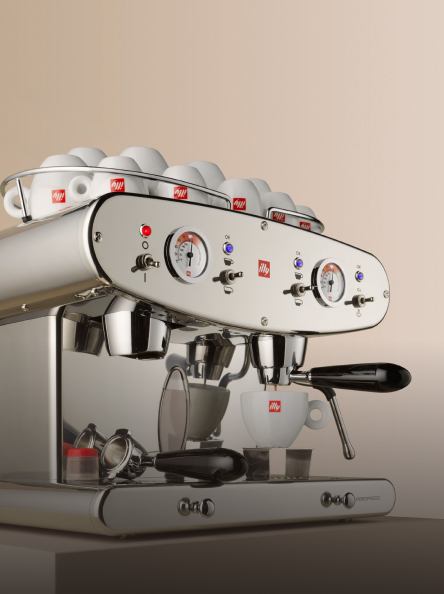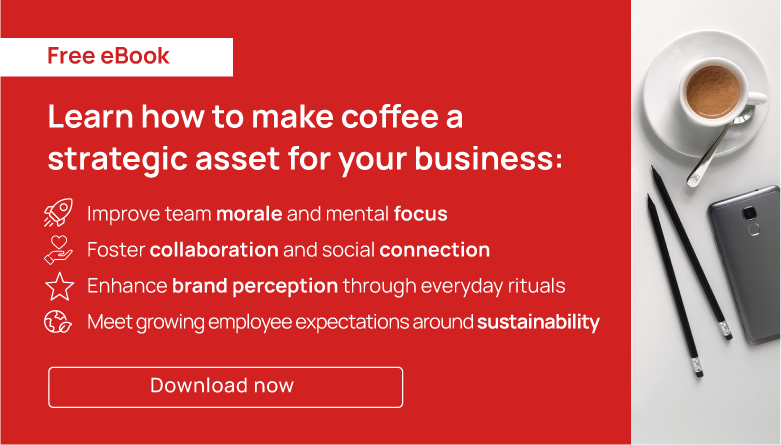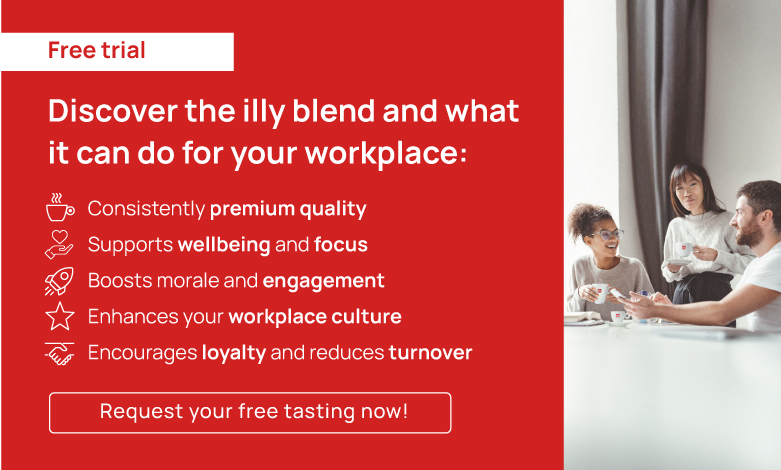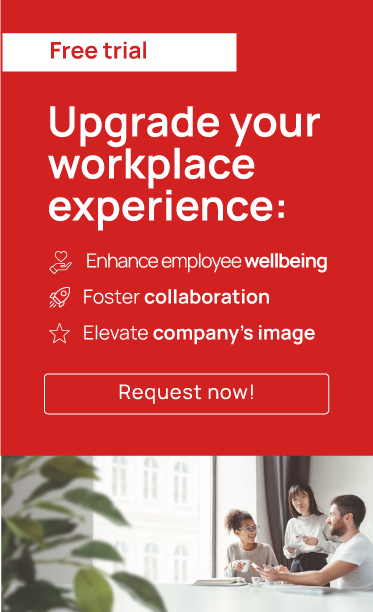In today’s workplace, where employee experience and wellbeing are at the forefront of HR and office design strategies, choosing the right office coffee machines is a strategic decision. From boosting morale to enhancing productivity, coffee plays a central role in the modern office- not just as a source of energy, but as a social catalyst that brings teams together, sparks conversations, and creates moments of connection throughout the day.
This article explores the essential features to look for when selecting the ideal machine for your business.
What should you look for in office coffee machines?
The ideal office coffee machine balances quality, ease of use, beverage variety, and sustainability — while also contributing to a positive and productive working environment.
Table of contents
- Why coffee in the office matters more than you think
- 8 essential features of office coffee machines
- Types of coffee machines available
- Coffee quality as a differentiator
- Request a free trial
Why coffee in the office matters more than you think
83% of employees say that high-quality coffee helps them focus and be more productive. The office coffee break is a key moment for social connection, mental recharge and informal collaboration. Offering quality coffee signals that a company values its people and their experience at work.
In fact, 75% of workers in the UK believe that being served premium coffee makes them feel more valued by their employer. Providing a well-equipped and inviting coffee corner with smart coffee machines is increasingly seen as a strategic investment in employee engagement.

8 essential features of office coffee machines
Choosing a coffee machine for the office is not as straightforward as selecting one for a home kitchen or even a café. Workplaces have specific operational, social and logistical needs that require tailored solutions.
Let’s explore the most critical requirements in more detail.
1. Reliable performance during high-usage periods
In most offices, coffee machines are used frequently and intensively, especially during peak times — early mornings, mid-morning breaks, and post-lunch slumps. Unlike home settings, where a machine may be used just a few times a day, office machines must serve dozens — sometimes hundreds — of employees daily.
This makes durability and performance stability essential. Machines must be built to last and must be capable of operating continuously without overheating, clogging, or experiencing technical faults. Look for models tested for commercial use, with components (like grinders, boilers and brewing groups) designed for long service life under heavy demand.
2. Consistent beverage quality
In an office, coffee is more than a beverage — it’s a shared ritual, a productivity tool, and often, a symbol of company culture. Every cup must meet a high and consistent standard, regardless of who operates the machine or when.
This is why precision in dosing, grinding and temperature control is so important. Whether preparing an espresso, cappuccino or americano, the machine must produce the same quality repeatedly. Inconsistent drinks can quickly undermine employee satisfaction and lower the perceived value of the coffee service.
%20(1).jpg?width=500&height=375&name=Machine_With%20500g%20-%20(top)%20(1).jpg)
3. Fast preparation times
Employees need to get their coffee and return to their tasks without wasting time. A good office machine should minimise wait times by offering:
- quick heat-up times thanks to powerful boilers or thermoblocks
- one-touch operation with pre-set drink selections
- simultaneous preparation of multiple drinks in higher-capacity models
Speed not only reduces queueing at the machine — it also ensures the coffee break remains a relaxing and efficient moment, not a bottleneck in the daily routine.
4. Easy refill and cleaning procedures
Maintenance must be straightforward. Office staff usually don't have time (nor the training) to manage complex cleaning routines or troubleshoot system errors.
The best machines offer:
- automatic cleaning and rinsing cycles
- clear indicators for water, milk, and bean refills
- removable parts for fast and hygienic cleaning
- low-maintenance milk systems or capsule options for simplified operation
Reducing manual interventions improves uptime, prolongs machine life, and lowers the burden on facility managers or admin teams.
5. Compatibility with beans, ground coffee, capsules or soluble formats
Flexibility is key in choosing a solution that aligns with the company’s size, culture and budget:
- Beans (especially when freshly ground) offer the best quality and are ideal for medium to large offices with a focus on premium experience.
- Capsules are practical and mess-free, well-suited for small offices or executive areas where variety and ease of use are prioritised.
- Soluble systems (instant coffee or powdered milk) provide a cost-efficient option for very high-volume environments where speed and affordability matter more than customisation.
- Hybrid models can support multiple input types, giving offices the option to scale or adapt their coffee program over time.
In addition to these formats, vending coffee machines represent a highly effective option for high-traffic areas, large corporate campuses or 24/7 environments. These automated systems can now deliver high-quality bean-to-cup beverages with a broad menu that includes espresso, cappuccino, latte and even plant-based options. Modern vending units offer:
- touchscreen interfaces with user personalisation
- fresh milk modules or powdered milk alternatives
- high output capacity (up to 600+ cups per day)
- energy-saving functions and automated cleaning systems
Coffee vending machines require no dedicated staff and ensure round-the-clock availability, making them an ideal solution for break rooms, canteens or shared service areas where autonomy, consistency and operational efficiency are key.
6. Variety and customisation
Today’s employees expect personalisation. The ability to choose between different roasts, drink formats (espresso, lungo, cappuccino, latte, iced), milk alternatives or strength levels is increasingly important — not just for taste, but for inclusivity.
Offering customisation reflects a workplace culture that values individual preference and employee wellbeing. It turns the coffee break into a moment of personal choice and comfort and reward — elements that contribute to a positive, human-centred office environment.

7. Sustainability and energy efficiency
Office equipment today must support a company’s ESG goals, and coffee machines are no exception. Look for models that:
- offer energy-saving modes and automatic turn-off features
- are built with recyclable or low-impact materials
- accept certified sustainable coffee (e.g. rainforest alliance, organic, or b corp-certified blends)
- enable waste minimisation, such as by using whole beans instead of capsules where possible
70% of employees say that sustainability influences their perception of the workplace — making this a factor with both environmental and reputational impact.
8. Design, size and space adaptability
Not all workplaces are alike. Whether equipping a compact startup office or a large-scale corporate HQ, the machine must fit seamlessly into the environment — functionally and aesthetically.
- compact machines with a small footprint are ideal for shared kitchens, meeting rooms or co-working spaces
- larger machines with multiple hoppers and milk modules are better suited to high-traffic areas or full-service break rooms
- a clean, modern design contributes to an inviting and professional break area, enhancing the overall image of the office.
Ultimately, the right office coffee machine is not about finding the most advanced model, but the one that meets the daily operational rhythms, cultural expectations, and consumption needs of your workplace.
Types of coffee machines available
Different offices have different coffee needs — whether based on team size, available space, or desired experience. Here’s an overview of the main categories of office coffee machines to help you identify the right solution:
| Machine Type | Ideal For | Coffee Input | Cups per Day | Best Suited For | Key Benefits |
|---|---|---|---|---|---|
| Bean-to-cup (Compact) | Small offices or executive areas | Whole beans + fresh milk or soluble milk | 20–100 | Offices with limited space but high expectations on quality | Premium drinks with compact footprint (e.g. Faema XCompact) |
| Bean-to-cup (Mid–High volume) | Medium to large teams | Whole beans + fresh or powdered milk | 100–600 | Busy offices, hospitality desks, shared spaces | High customisation, fast output, user-friendly (e.g. Faema X20/X30/X60) |
| Fully automatic vending machines | Large-scale, high-traffic environments | Beans + soluble powders | 150–250+ | Campuses, airports, large buildings | Multi-beverage, touchless, hybrid features (e.g. COTI, NEO-Q) |
Coffee quality as a differentiator
In a landscape where hybrid work and employee experience are shaping the future of workplaces, the quality of coffee served in the office is no longer a secondary detail — it’s a clear signal of a company’s values and priorities.
More than just a beverage
Workplace coffee has evolved from being a basic amenity to a daily ritual tied to wellbeing, productivity and social interaction. According to illy UK research, 55% of employees rate the quality of coffee higher than other common workplace perks, such as lighting or recreational features. For many, the coffee corner is where ideas are exchanged, bonds are built and energy is recharged.
Why quality matters
- Flavour consistency: whether using beans, ground coffee or capsules, machines should extract a cup with the same aroma and balance every time — especially at peak usage times.
- Taste perception: a poorly made coffee reflects negatively on the brand. In contrast, a rich and well-prepared espresso or creamy cappuccino can uplift the mood and add perceived value to the workday.
- Sensorial experience: premium coffee engages all senses — from the aroma that fills the space to the crema, mouthfeel and aftertaste. This multisensory quality plays a role in forming emotional connections with the brand and workplace.
The link between quality and retention
In a competitive labour market, companies are exploring new ways to retain and engage talent. Offering high-quality coffee is a subtle yet powerful way to:
- show care and attention to employee wellbeing
- differentiate the workplace experience from home settings
- reinforce the company's positioning as premium, innovative, or people-focused
A high-quality coffee machine — capable of doing justice to a premium blend — becomes a tool of internal branding. It communicates professionalism, hospitality, and high standards not only to employees but also to visiting clients, candidates or partners.

A tangible expression of corporate culture
Just like sustainable office furniture or design-forward meeting spaces, the coffee you serve reflects your company culture. Providing a premium blend served at its best quality means aligning everyday details with larger values: care, excellence, sustainability, and attention to experience.
Request a free trial
Selecting the right office coffee machines is a smart investment in your people, your culture, and your workplace reputation. A good machine — paired with premium coffee and thoughtful service — turns a routine break into a moment of energy, creativity and connection.
Want to elevate your workplace coffee experience? Try illy’s office coffee solutions with a free trial.
The office coffee break plays an important role in the context of employee wellbeing, positively influencing morale, creativity and collaboration, crucial elements for a stimulating and productive working environment.
Want to know more?
Subscribe to the illy Office newsletter!





